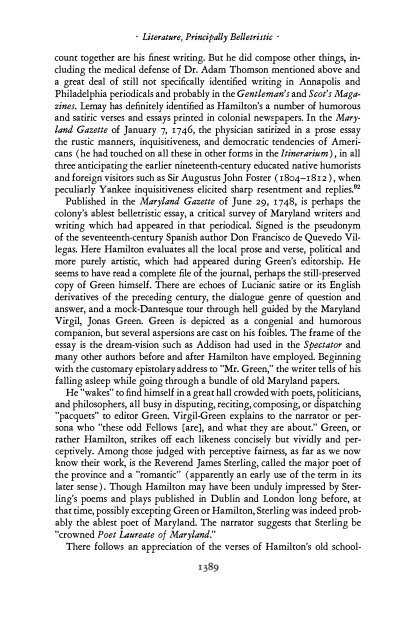Literature, Principally Belletristic - University of Tennessee, Knoxville
Literature, Principally Belletristic - University of Tennessee, Knoxville
Literature, Principally Belletristic - University of Tennessee, Knoxville
You also want an ePaper? Increase the reach of your titles
YUMPU automatically turns print PDFs into web optimized ePapers that Google loves.
· <strong>Literature</strong>, <strong>Principally</strong> <strong>Belletristic</strong> .<br />
count together are his finest writing. But he did compose other things, including<br />
the medical defense <strong>of</strong> Dr. Adam Thomson mentioned above and<br />
a great deal <strong>of</strong> still not specifically identified writing in Annapolis and<br />
Philadelphia periodicals and probably in the Gentleman's and Scot's Magazines.<br />
Lemay has definitely identified as Hamilton's a number <strong>of</strong> humorous<br />
and satiric verses and essays printed in colonial newspapers. In the Maryland<br />
Gazette <strong>of</strong> January 7, 1746, the physician satirized in a prose essay<br />
the rustic manners, inquisitiveness, and democratic tendencies <strong>of</strong> Americans<br />
(he had touched on all these in other forms in the Itinerarium), in all<br />
three anticipating the earlier nineteenth-century educated native humorists<br />
and foreign visitors such as Sir Augustus John Foster (1804-1812), when<br />
peculiarly Yankee inquisitiveness elicited sharp resentment and replies.92<br />
Published in the Maryland Gazette <strong>of</strong> June 29, 1748, is perhaps the<br />
colony'S ablest belletristic essay, a critical survey <strong>of</strong> Maryland writers a:ld<br />
writing which had appeared in that periodical. Signed is the pseudonym<br />
<strong>of</strong> the seventeenth-century Spanish author Don Francisco de Quevedo Villegas.<br />
Here Hamilton evaluates all the local prose and verse, political and<br />
more purely artistic, which had appeared during Green's editorship. He<br />
seems to have read a complete file <strong>of</strong> the journal, perhaps the still-preserved<br />
copy <strong>of</strong> Green himself. There are echoes <strong>of</strong> Lucianic satire or its English<br />
derivatives <strong>of</strong> the preceding century, the dialogue genre <strong>of</strong> question and<br />
answer, and a mock-Dantesque tour through hell guided by the Maryland<br />
Virgil, Jonas Green. Green is depicted as a congenial and humorous<br />
companion, but several aspersions are cast on his foibles. The frame <strong>of</strong> the<br />
essay is the dream-vision such as Addison had used in the Spectator and<br />
many other authors before and after Hamilton have employed. Beginning<br />
with the customary epistolary address to "Mr. Green," the writer tells <strong>of</strong> his<br />
falling asleep while going through a bundle <strong>of</strong> old Maryland papers.<br />
He "wakes" to find himself in a great hall crowded with poets, politicians,<br />
and philosophers, all busy in disputing, reciting, composing, or dispatching<br />
"pacquets" to editor Green. Virgil-Green explains to the narrator or persona<br />
who "these odd Fellows [are}, and what they are about." Green, or<br />
rather Hamilton, strikes <strong>of</strong>f each likeness concisely but vividly and perceptively.<br />
Among those judged with perceptive fairness, as far as we now<br />
know their work, is the Reverend James Sterling, called the major poet <strong>of</strong><br />
the province and a "romantic" (apparently an early use <strong>of</strong> the term in its<br />
later sense ). Though Hamilton may have been unduly impressed by Sterling's<br />
poems and plays published in Dublin and London long before, at<br />
that time, possibly excepting Green or Hamilton, Sterling was indeed probably<br />
the ablest poet <strong>of</strong> Maryland. The narrator suggests that Sterling be<br />
"crowned Poet Laureate <strong>of</strong> Maryland."<br />
There follows an appreciation <strong>of</strong> the verses <strong>of</strong> Hamilton's old school-















